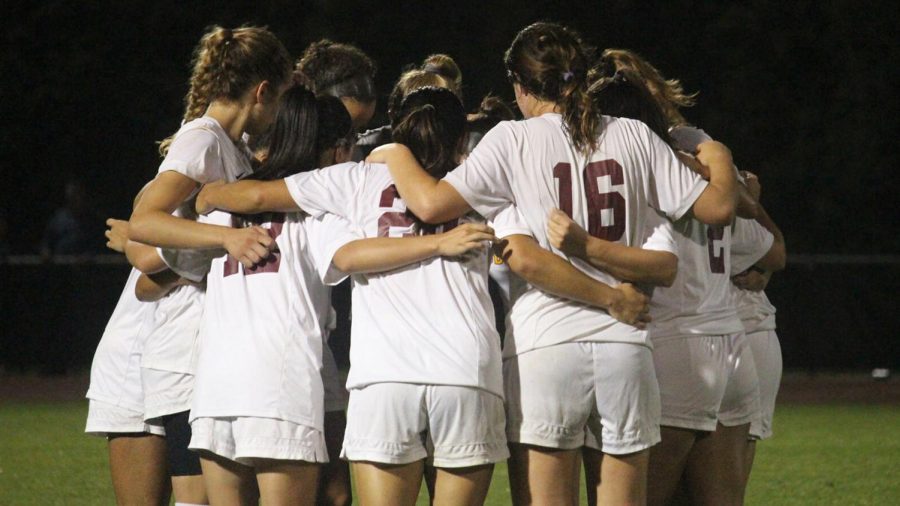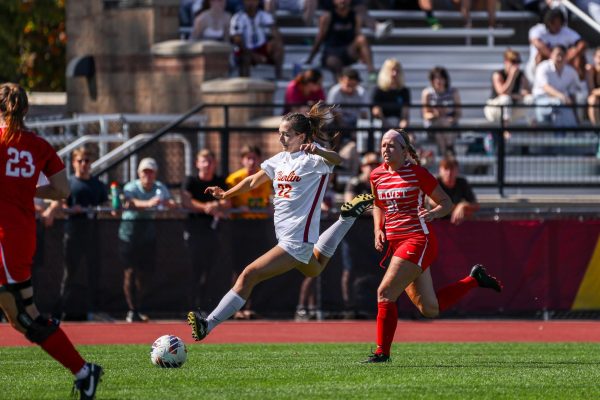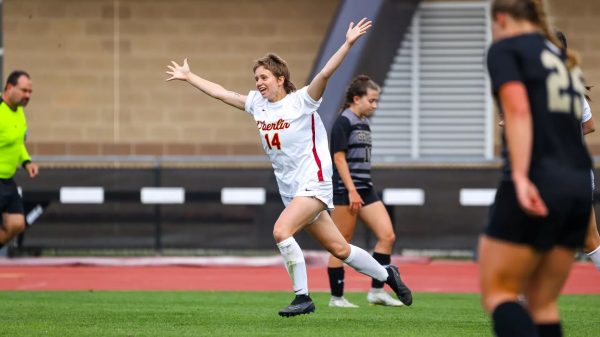Bench players face unique challenges in opportunity and reward
Oberlin women’s soccer stands in a team huddle on Fred Shults Field during a game in the 2021 season.
Oberlin athletes put an immense amount of time and dedication into their sport, but not every player has an equal chance to reap the benefits. Across every athletic team at Oberlin, there are players who train and travel with their teammates only to stand on the sidelines, cheering on their team and waiting for the moment when they’ll get a chance to compete. These athletes, sometimes referred to as bench players, almost never get called up to the field. Instead, game after game, they wait in the most dreaded space in athletics: the sideline.
“Every match, I have to be mentally prepared to play, and then I’ll just sit and wait for literally four or five hours not knowing whether or not I’ll play that day,” said Amelia Bronfman, a second-year on the women’s tennis team. “I just have to cheer everyone else on and try to support everyone else as best I can.”
Bronfman walked on to the tennis team last spring, and has faced difficulty getting put in the lineup since. She mentioned that because she doesn’t often get included in the lineup, whether or not she gets to play in a match relies heavily on a number of factors, including timing of the “real” matches and court availability.
Isa Morales, a first-year goalkeeper on the women’s soccer team, has faced similar difficulties getting playing time. She talked about the ways in which coaches interact differently with starting players than with players who get less game time.
“When a coach has kind of set their mind on who the starter is going to be, they treat the other goalkeepers very differently,” Morales said. “We don’t really get much feedback, much constructive criticism, anything like that.”
Bronfman mentioned that her coach often has individual practices with starting players that he doesn’t have with her. Additionally, her coach occasionally asks her not to come to practice so that the numbers work out better for drills. She talked about how the dynamic between her and her coach is different from the dynamic he has with other players on the team.
“I think that [my coach] can be a little bit tougher on the people who don’t play as much,” Bronfman said. “I think he puts more time and energy and affection toward the people who usually win him a lot, but I don’t think he means it. I think it’s unconscious.”
Jack Page is a first-year on the men’s baseball team who walked on to the team in the fall. He’s been practicing and playing with the Junior Varsity team and consequently hasn’t had many opportunities to log official game minutes. He pointed out that while there is some differential treatment on his team, he thinks it’s best for the team as a whole.
“In season there is definitely more focused coaching on my teammates who get more playing time, but that’s what gives us the best chance to win,” Page wrote in an email to the Review. “We’re all held to the same standards.”
Morales also talked about the ways in which her role on the team can change the way that her teammates interact with her.
“Outside of the field, I’m friends with everyone on the team,” Morales said. “But when we’re in practice, I sometimes feel like since I’m not a starting goalkeeper [and] I haven’t gotten any minutes in, they don’t take me as seriously when they’re on my side during drills.”
Bronfman agreed with Morales, making sure to distinguish between the intentions and actions of her teammates and the role played by the culture of her sport.
“Even though my coach and my teammates try really hard to include me and make me feel like I really am a member of the team, I just feel like the culture that we live in makes it impossible for them to see me as valuable or as equal,” Bronfman said. “I don’t think that’s necessarily their fault, but that doesn’t mean that that makes me feel any better about it.”
Both Morales and Bronfman mentioned that their role as a bench player, combined with the differing treatment from coaches and teammates, has limited their opportunities to grow within their sport.
“The better people get more chances to get better, and if you’re not as good, you don’t get the chances,” Bronfman said. “I can only imagine how much more I would have improved if I had had equal time like that.”
Despite having fewer opportunities to make a difference on the field, the court, or the track, bench players still contribute to the team and to the team spirit. When the bench players cheer on teammates and support them, the mood and energy on the field can pick up dramatically. Morales even mentioned that being a step removed from the action can give bench players a unique perspective on the game.
“I think my biggest role right now is supporting my teammates, more than anything,” she said. “Even if I’m not physically on the field during games, I want to be cheering them on. I want to be as much help as possible, especially with the goalkeeper that is playing.”
Despite the difficulties that come with being a bench player, these players still have the same love for their sports as starting players, and they still benefit from the team environment. Morales spoke on this feeling.
“I still do really love being part of the team, and I don’t think not playing is something that is going to deter me from being a part of the team,” she said. “It’s motivated me to do more — I’m very excited for next year, I’m very excited to keep trying.”
Page agreed. He wrote about how while he’s not a starting player, he feels like his job is to just do what he can until the day comes when he’s needed.
“The other guys on the team, no matter their role, are my friends, my teammates,” Page wrote. “I’ll do whatever I can to help put them, myself, and our team in the best situation. Whether that is in the field or off, I can cheer them on and do what I can to help us all get better.”








